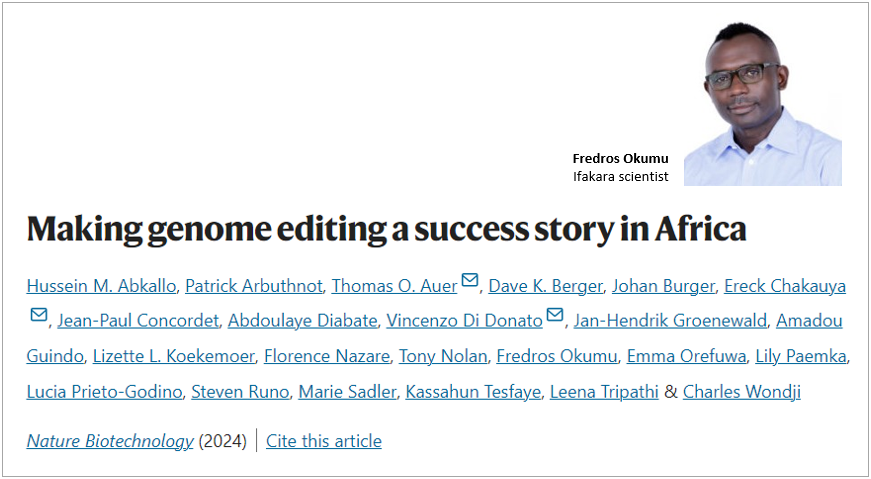
INNOVATION: How genome editing can improve livelihoods, prosperity in Africa

A group of scientists from Africa and Europe have discussed the potential of genome editing, particularly in Africa. Their insights, published on the renowned Nature journal, also shed light on the challenges hindering its broad adoption and application across the continent.
The 23 scientists, including Fredros Okumu from the Ifakara Health Institute, underscore the massive potential of genome editing to “improve livelihoods and prosperity on the continent.”
What is genome editing?
The World Health Organization (WHO) defines genome editing as “a method for making specific changes to the DNA of a cell or organism.”
The revolutionary genetic engineering technique enables accurate modification of DNA which can be added, removed, modified, or replaced in a living organism.
Learn more about genome editing here.
Potential of genome-editing innovations
Diving deeper into the potential of genome-editing innovations in Africa, the scientists discuss how it could be used and its impact on the public health, agriculture and livestock sectors.
“Genome editing, in contrast to more classical genetic modification approaches, promises greater accuracy, precision, efficiency and cost-effectiveness and, in turn, a better return on investment,” they emphasize.
For its use in agriculture, the scientists highlight its potential to create crops and livestock with enhanced traits such as disease resistance and improved productivity. In regions facing these challenges, they note the eagerness of African scientists to use genome editing for tailored solutions.
“Kenyan and Ethiopian scientists have partnered with Corteva Agriscience to develop genome-edited sorghum... Other initiatives such as the International Institute of Tropical Agriculture (IITA) are developing genome-edited bananas with resistance to bacterial and viral diseases.”
The scientists also highlight the potential of genome editing in the public health sector, where it can aid in combating endemic diseases like malaria and viral infections by providing insights into their resistance mechanisms and therefore improve strategies for vector control.
Why Africa lags in applying genome editing?
Recognizing the potential of genome editing, the scientists express concerns about its “underexploration” on the continent, especially when it can be “transformative in addressing key challenges in major sectors (including agriculture, public health and medicine).”
They outline several challenges contributing to Africa’s delayed adoption of genome editing, including mistrust, regulatory uncertainty, limited resources, shortage of trained professionals, and low investment in research and development, among others.
“Similar to other biotechnologies, genome editing faces substantial obstacles in Africa… There is also little investment: most countries devote less than 1% of their gross domestic product (GDP) to research and development,” wrote the scientists.
“The dependency of African institutions on external funding, unequal collaborations with the Global North and control of intellectual property and licensing by foreign entities further hinder progress.”
“Additionally, there are low levels of integration of biotechnology in school and university curricula, inaccurate risk perceptions and apparent low levels of public support (often due to misinformation), and, as a consequence, inadequate political will,” they add.
Overcoming obstacles to genome editing in Africa
To overcome these obstacles, the scientists suggest several strategies. Firstly, they recommend proactive engagement and transparent communication to build trust among stakeholders regarding the benefits and risks of genome editing.
“Integrated communication strategies should be developed by governments, regulators and research institutes that build trust through proactive engagement and guarantee well-informed decision-making. Scientists, educators, policymakers and stakeholders must explain, in open and accessible dialog, the scientific principles, potential benefits and risks associated with genome editing.”
Additionally, they propose updating outdated regulatory frameworks to accommodate diverse genome-edited products. Here, they recommend promoting regional integration and harmonization, suggesting that Africa could achieve this by pursuing unity through pan-African organizations to address continental challenges across all relevant sectors.
Ensuring successful implementation
The scientists also underscore the establishment of local infrastructure, provision of adequate funding, and investment in training programs – all of which guarantee the successful implementation of genome editing-based technologies in African life-science research and development.
“One of the most important elements to the success of genome-editing initiatives in Africa is the creation of a critical mass of local scientists with up-to-date practical expertise. These scientists, acting as catalysts, can teach colleagues, advise governments and spearhead knowledge and technological development.”
Lastly, the scientists recommend that African governments engage in public-private partnerships to co-finance genome-editing projects stating, “These collaborations can bring together government funding, private sector investments and philanthropic contributions to create a sustainable and diversified funding model.”
“Overall, we envision that if our recommendations are followed and key investments are made in public engagement, regulation, funding and capacity building in infrastructure and human capital, the next generation of genome-editing innovations will come from inventors in Africa.”
“Genome-editing products that are locally developed will help to address the Sustainable Development Goals and improve livelihoods and prosperity on the continent,” concluded the scientists.
Authors of the article
The authors of this article include a team of scientists from various research and academic institutions across Kenya, South Africa, Switzerland, the UK, France, Burkina Faso, Spain, Mali, Tanzania, Ghana, Ethiopia, and Cameroon.
Read the full publication here.
